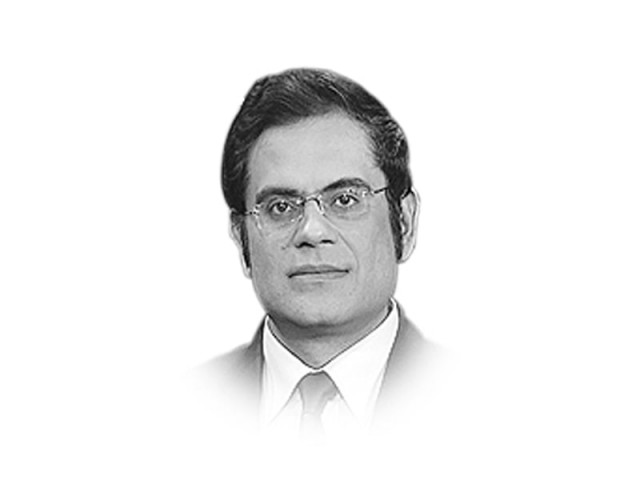Abdullah Hussein: alive in his vision
Hussein leaves behind a formidable legacy of literary works that will be of immense value to readers of tomorrow

The writer is affiliated with the Express group and is consulting editor at The Friday Times
Hussein’s characters in Udaas Naslain recount the upheavals that Indians had to engage with since 1857. The novel’s formidable brush depicts the early 20th century milieu of Punjab as its protagonist experiences the rapidly changing political events. Hussein presents a panoramic, existentialist view of the First World War and how that impacted the ‘natives’ in the Indo-Pak subcontinent. The most moving parts of the novel concern the Partition of 1947. Towards the end, the book’s main character, Naim Baig, grapples with a new reality along with immense emotional and historical baggage.
Not unlike Hussein, his almost anti-hero, Naim Beg, is an idealist, but is swept away by larger historical forces. It is Naim’s persona that struck a chord with the post-independence generation, for it was as unfulfilled as him. As Pakistan’s chequered history evolved, the incoming generations have also found a voice for themselves. The novel has an innate absurdist streak, which fits in well with the society that we have created in the preceding decades. Fifty years later, Udaas Naslain remains in print with dozens of editions keeping it accessible. Its everyday language enriched the scope of Urdu fiction. Some found its language obscene and before the morality brigade could strike, the state awarded it the Adamjee Award.
Hussein’s later works were equally probing. In Baagh, Hussein wrote about Operation Gibraltar and challenged the official view on the 1965 war. The work, in effect, presented an alternative version of events. This was courageous to say the least. Another major novel, Naadar Log (The Dispossessed, 1997), dealt with the leaks from the Hamoodur Rehman Commission report — set up to investigate the 1971 debacle. Nadaar Log is among a handful of literary works that attempted to discuss what happened in East Pakistan (now Bangladesh). A culture of silence and obfuscation prevails to date otherwise.
Hussein left Pakistan in the late 1960s and remained in the UK for nearly four decades where he owned and ran an off-licence. Most of his later works were penned while living abroad. Other important works include Qaid (Captivity, 1989) and collections of short stories such as Nashaib (Downfall by Degrees, 1981). The latter traversed different parts of the world and made a strong critique of contemporary Pakistani values. In 2000, he wrote his first novel in English — Emigre Journeys — that explores issues of identity, immigration, and the inter-generational tensions within Pakistani migrants abroad. The acclaimed BBC feature film titled Brothers in Trouble was based on Hussein’s short story, The Return Journey.
Hussein’s dramatic utterances, such as the absence of serious work on his literary output, are not far off from reality. Divided in little cult groups, Pakistan’s literary establishment ensured that Hussein remained somewhat of an outsider. This is why the range and significance of his work has not been fully assessed. Hussein remained wary of literary critics like Qurratulain Hyder, who was also allergic to our critics and their interpretations. Even though Hyder, in her autobiographical novel Kar e Jahan Daraz Haye, accused Hussein of plagiarising passages from her novel, he still graciously acknowledged that she was the greatest of Urdu novelists.
A few years ago, Hussein moved back to Pakistan and settled in Lahore. Due to his stature, he could not be ignored and was a regular speaker at the assorted literary festivals where he had the chance to interact with a wide variety of people. At his last public appearance in Lahore, his session attracted huge crowds, yet quite ironically it was given the smallest of spaces by the organisers. This reflects, above all, our view of local writers and their worth. Hussein was acutely aware of this and made public remarks about the status of Urdu and how it was viewed by the English-speaking elite.
I got to know him through the Karachi Literature Festival; and feel most privileged to have spent some time with him. Since 2009, we were regularly in touch. For the past year, due to my absence from Pakistan, our key medium of communication was Facebook where Hussein was most active. Iconoclastic, candid and engaged till his last, he frequently commented on culture and politics, and gave me much comfort when I needed it the most. Hussein was not averse to expressing his vulnerabilities. For instance, he posted about his painful chemotherapy sessions regularly. After the fourth round, he wrote: “Writers are an unhappy lot. They want to change the world to their vision and they can’t even begin to make themselves understood.” In part, this struggle was also with himself, his own dislocation both at home and abroad.
Hussein leaves behind a formidable legacy of literary works that will be of immense value to readers of tomorrow. Aside from being literary pleasures, his stories are also social histories of the 20th century. While he has been relieved of the chemo torture, Pakistani literature has lost an authentic voice. One rarely finds someone saying this in public and Hussein said it: “Religion is a weapon that claims universal ownership. If you make a country in the name of religion, you make everybody a fanatic.”
Rest in peace Abdullah saheb.
Published in The Express Tribune, July 8th, 2015.
Like Opinion & Editorial on Facebook, follow @ETOpEd on Twitter to receive all updates on all our daily pieces.















COMMENTS
Comments are moderated and generally will be posted if they are on-topic and not abusive.
For more information, please see our Comments FAQ